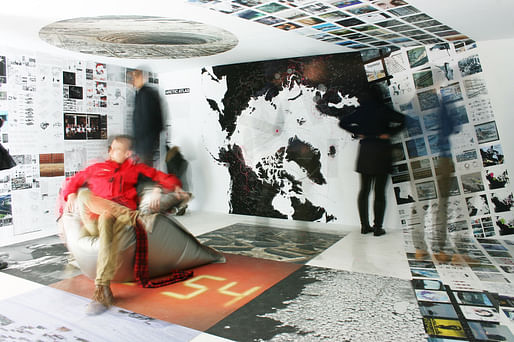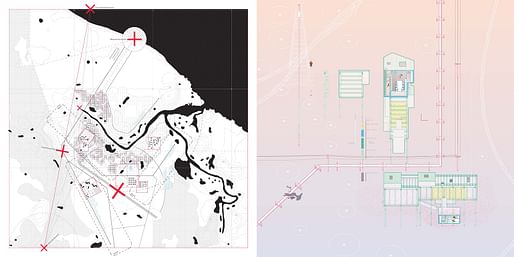

This post is brought to you by University of Virginia's School of Architecture
For students and faculty at the University of Virginia’s School of Architecture the future of cities is now. The School’s Dean Ila Berman recently announced her intention to launch the NEXT CITIES INSTITUTE, an interdisciplinary design and research platform focused on the rapidly changing dynamics of global urban futures. With an aim to forecast and shape the vital urbanism of this century, the NEXT CITIES INSTITUTE will be a university-wide initiative, led by the School of Architecture and coalescing expertise throughout the University of Virginia, with partners in its Schools of Law, Leadership and Public Policy, Engineering, and Arts and Sciences. Berman states, “The NEXT CITIES INSTITUTE is predicated on our commitment to how design operates as a tool to effectively reshape the world. It recognizes that cities are our largest collective cultural artifacts, and their strategic re-conception is crucial to our future.”
As a dynamic platform for design, policy and action focused on new forms of urban research, the NEXT CITIES INSTITUTE calls into question the traditional planning techniques that defined much of the twentieth-century. Three critical paradigm shifts - planetary urbanization, climate change and the accelerating transformation of information technologies - are fundamentally reshaping the city of the 21st century, as the historic automobile city is increasingly unable to cope with the ways in which the city territory is changing. The NEXT CITIES INSTITUTE is tackling the complex inter-relationships between our growing cities and their impacts, such as resource allocations and consumption, territorial migrations and informal settlements, ecological fragility and resiliency. In studios, classrooms, labs and on-site, students and faculty are inventing new spatial and infrastructural concepts and strategies with which to reimagine and redefine global urban futures.

In order to address the inherently complex urban challenges of today, the School of Architecture recognizes the demand for synthetic thinking and making. The NEXT CITIES INSTITUTE defines its research agendas across traditional disciplinary boundaries, building on UVA Architecture’s history of interdisciplinary collaboration that emerged from having architecture, landscape architecture, urban and environmental planning and design operating cohesively within a single school. In addition, the NEXT CITIES INSTITUTE catalyzes the expansion of this collaboration to involve faculty and students from environmental science, cyber-physical systems, data science, law, public policy, and economics, among others. Building upon what is already a robust studio environment at UVA’s School of Architecture, the NEXT CITIES initiative enables students to focus on real-world issues with input and expertise drawn from other disciplines. Dean Berman elaborates, “We also need to give our students a broadened global perspective. To be relevant, our degree programs need to be linked to the real world so that we can actively participate in cultural evolution and exchange.”
The NEXT CITIES initiative provides students and faculty with exciting opportunities for integrated learning and teaching that reach well beyond UVA’s immediate surroundings. With on-going projects in China, India, Argentina, Spain, Africa, the Arctic and multiple national and international coastal communities, the School of Architecture is committed to providing students with a worldview that addresses a climate of increasing pluralism, with multiplying possibilities and points of view. Importantly, when engaged in diverse locations across the globe, students and faculty work directly with organizations and communities in-situ, making the NEXT CITIES INSTITUTE a vehicle for engagement and action through design.
The NEXT CITIES initiative identifies four larger frameworks for the design of the 21st century city: Asian megacities, Water cities, Arctic cities, and Smart Cities. The School of Architecture builds the curriculum of many of its research studios and seminars to address these frameworks, while also hosting workshops, symposia and exhibitions to further stimulate dialogue and design responses. In collaboration with ar+d/ORO publishers, the NEXT CITIES INSTITUTE is also developing a publication series, the first of which will be launched in 2018 on Arctic Cities. This semester, students are traveling to Alaska, Tokyo, Hong Kong, New Delhi, Buenos Aires, the Ruhr valley, Barcelona, and more, capitalizing on the expertise of ongoing, faculty-led research projects like the Arctic Design Group, the Yamuna River Project, and UVA Smart Environments.

Like the metaphorical framework of urban metabolism, the NEXT CITIES INSTITUTE is an evolving, fluid and dynamic platform that allows the faculty, students, partners, and collaborators at UVA School of Architecture to study the interactions of natural and human systems within cities. The NEXT CITIES initiative not only expands the resources of the School, but also prioritizes the ways in which architecture, through its broad definition, is an active practice that operates as an agent of cultural transformation. Architecture - in its theory and physical instantiation in the world - probes the questions and controversies of the day, continually writing new expressions of the city. UVA School of Architecture students are empowered to critically and creatively generate these new expressions and to define their own visions for urban futures. With the forthcoming launch of the NEXT CITIES INSTITUTE at UVA’s School of Architecture, students and faculty are transforming intellectual inquiry into practice, to actively vision and create tomorrow’s global urban futures today.
No Comments
Block this user
Are you sure you want to block this user and hide all related comments throughout the site?
Archinect
This is your first comment on Archinect. Your comment will be visible once approved.